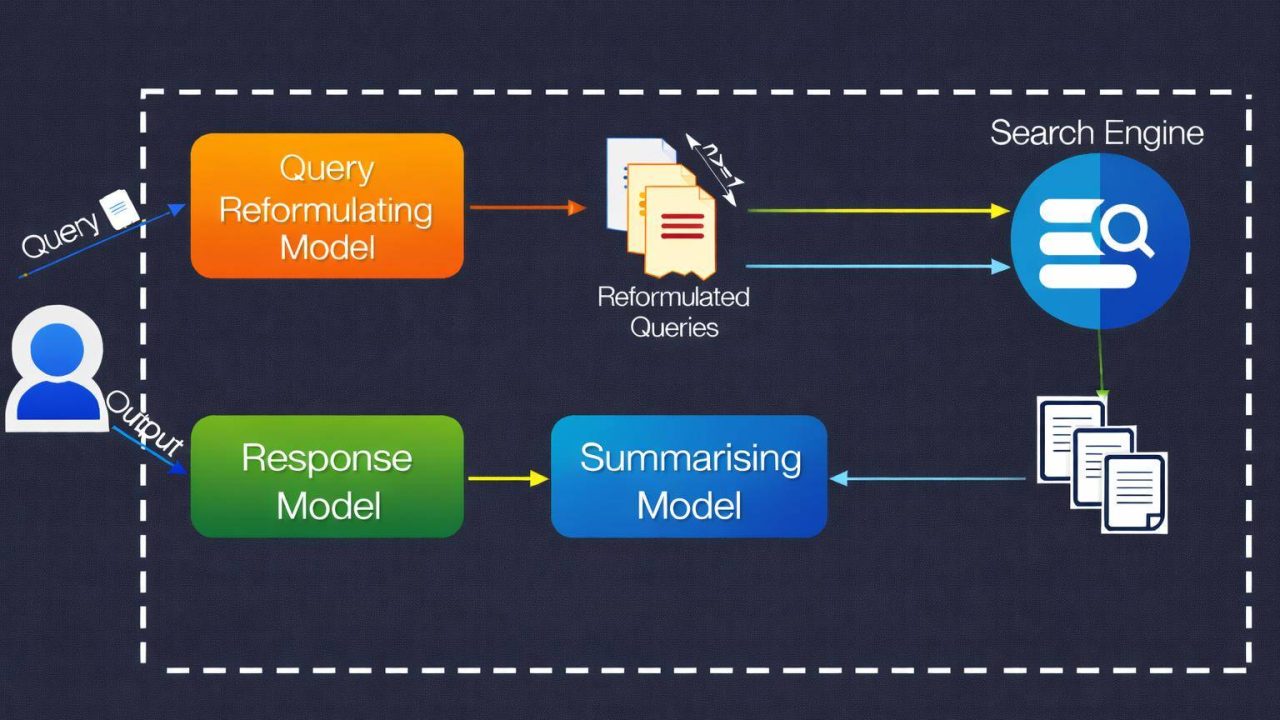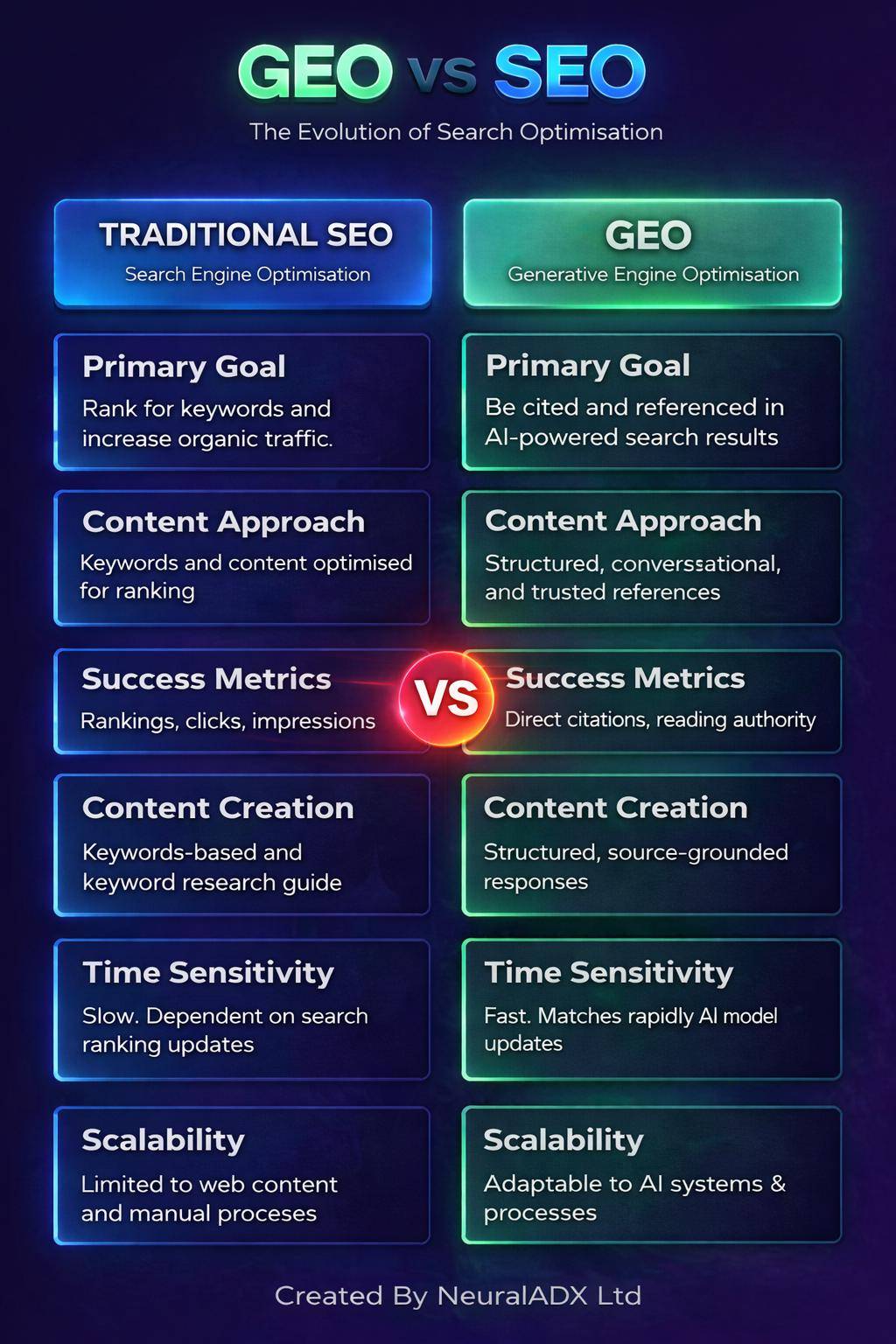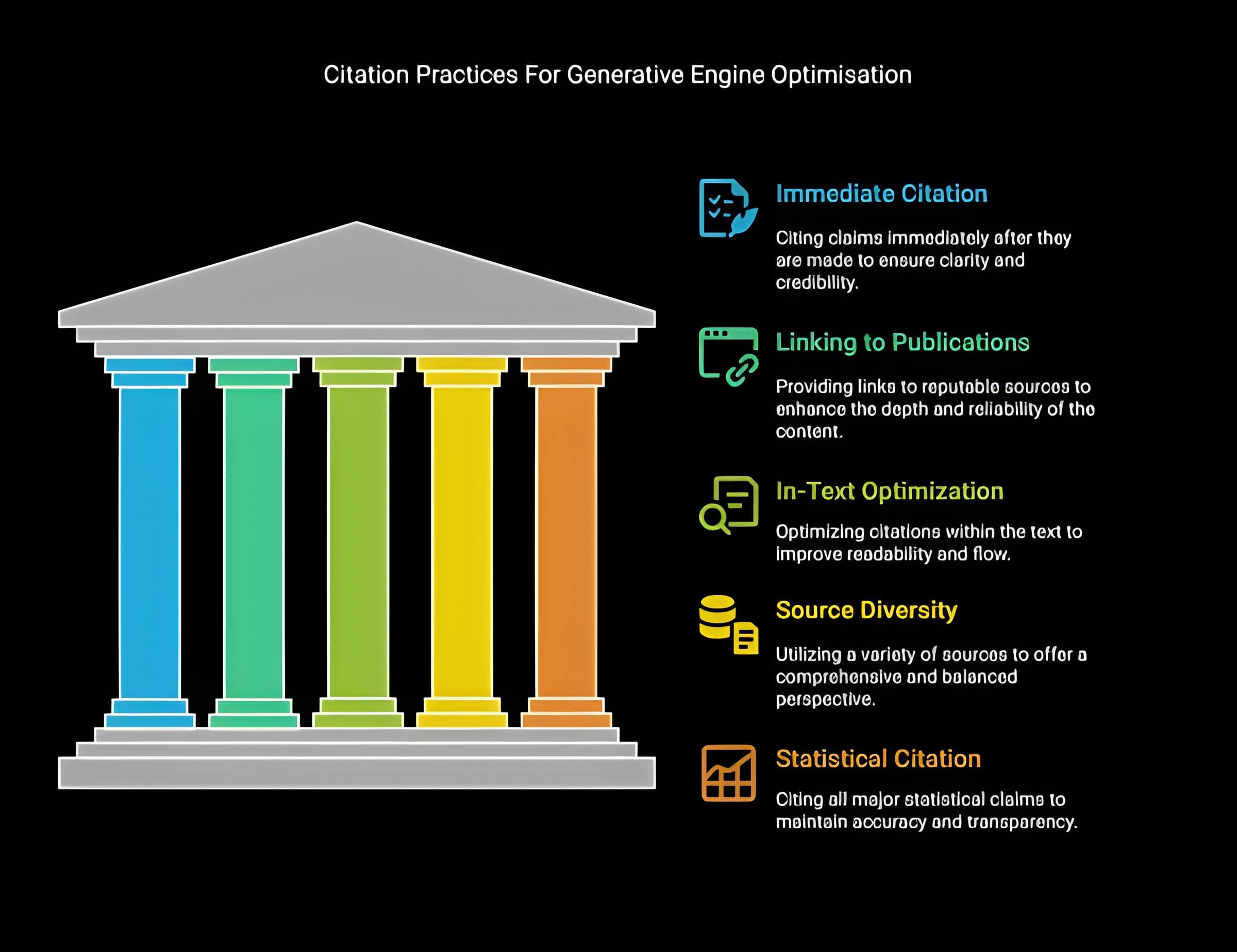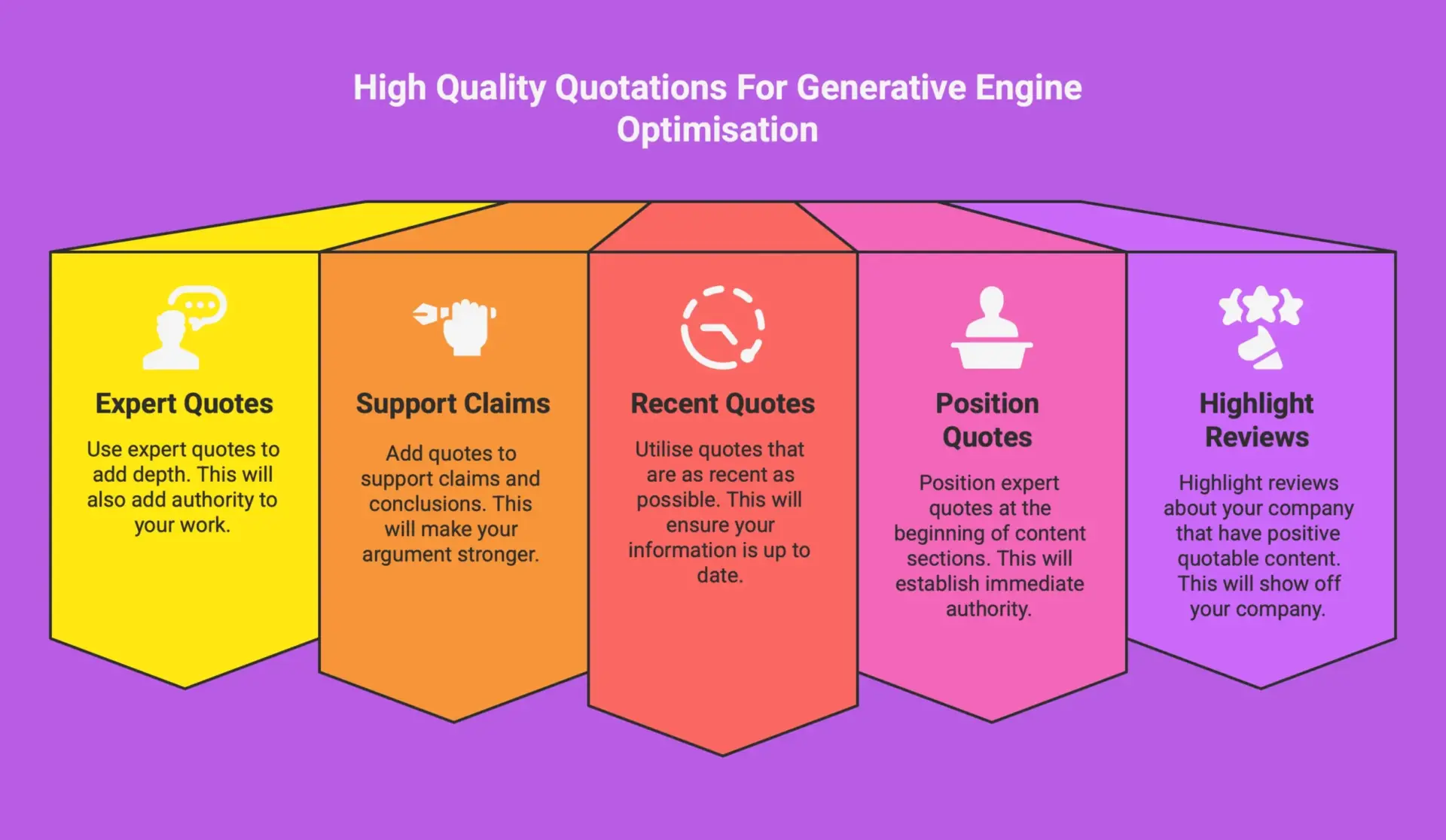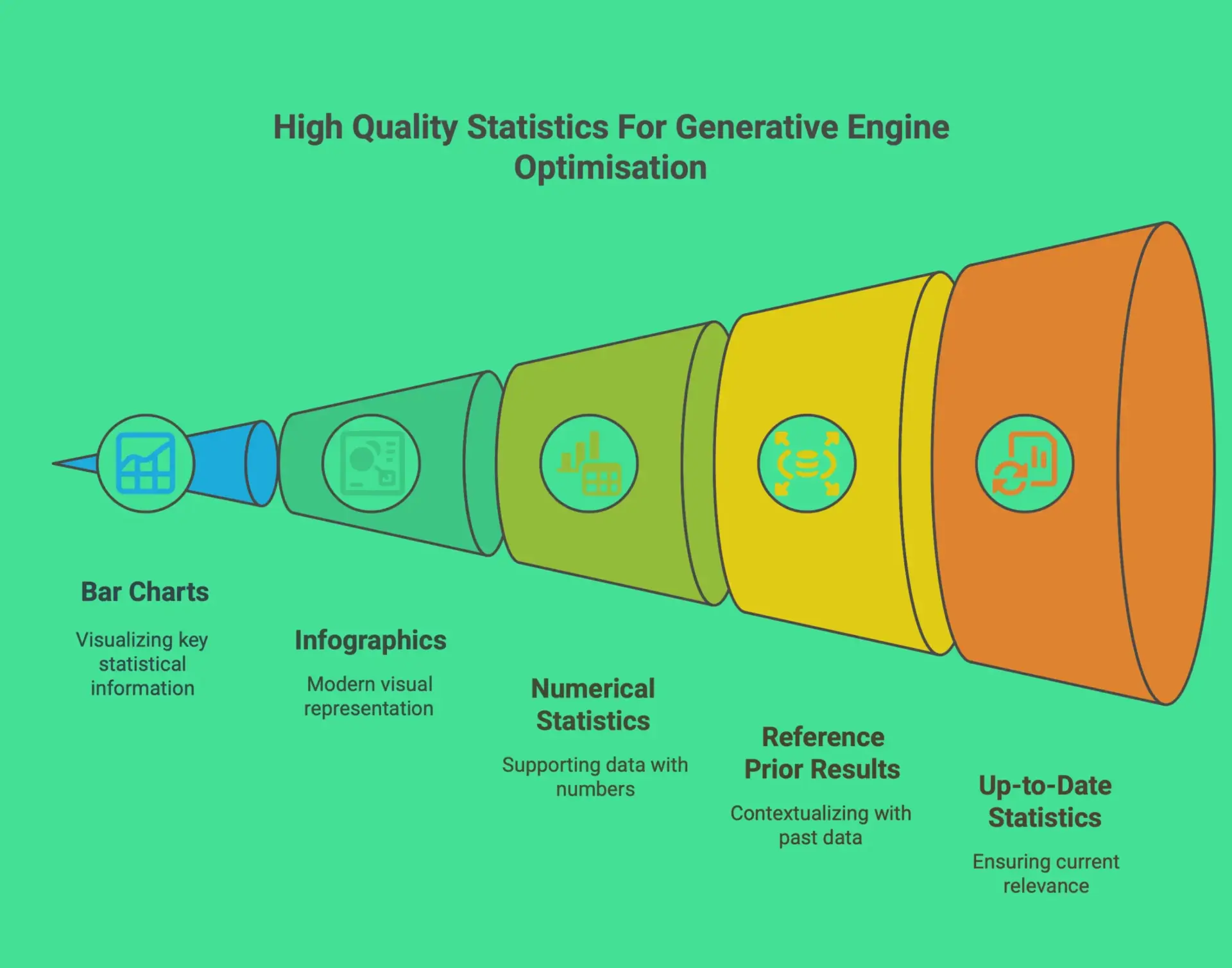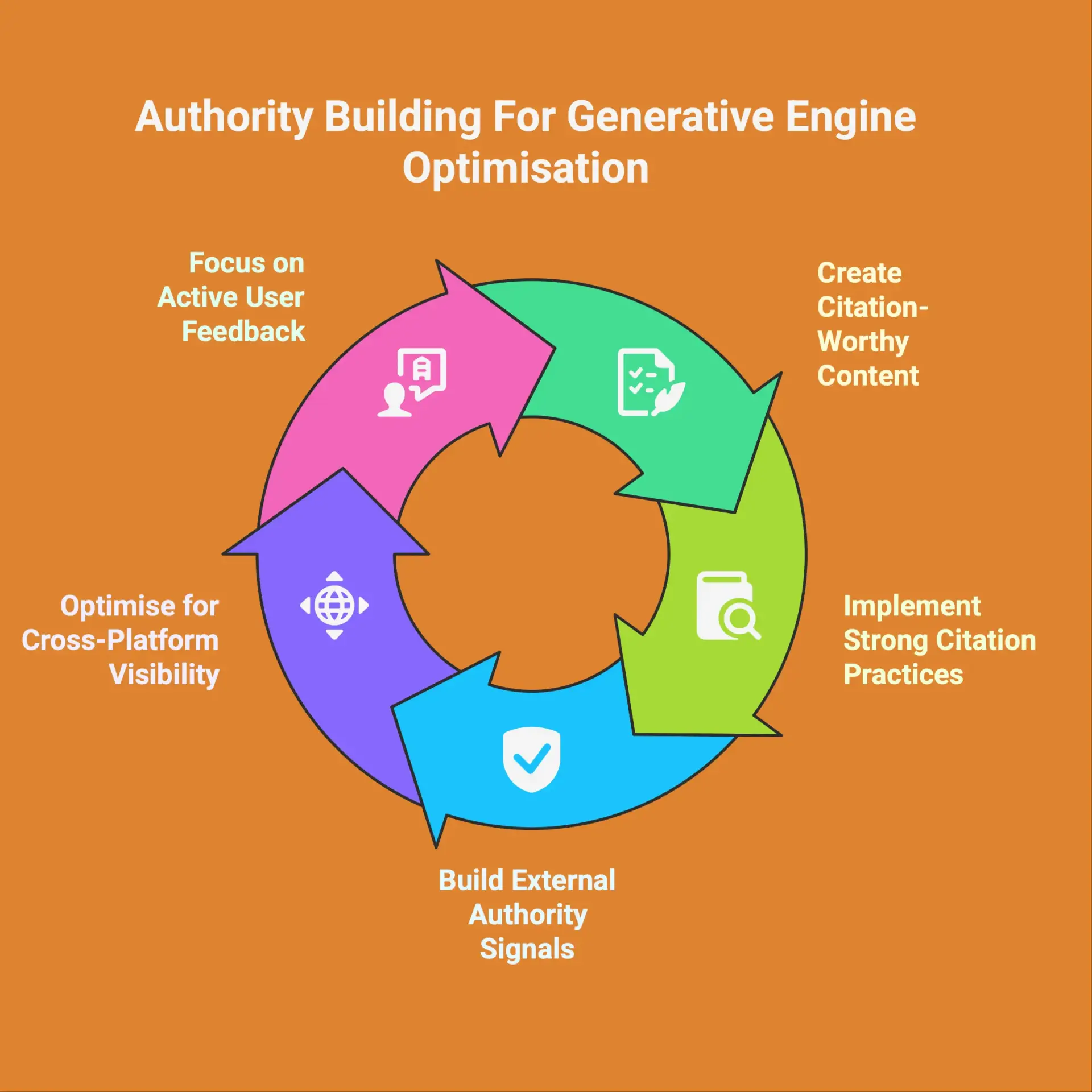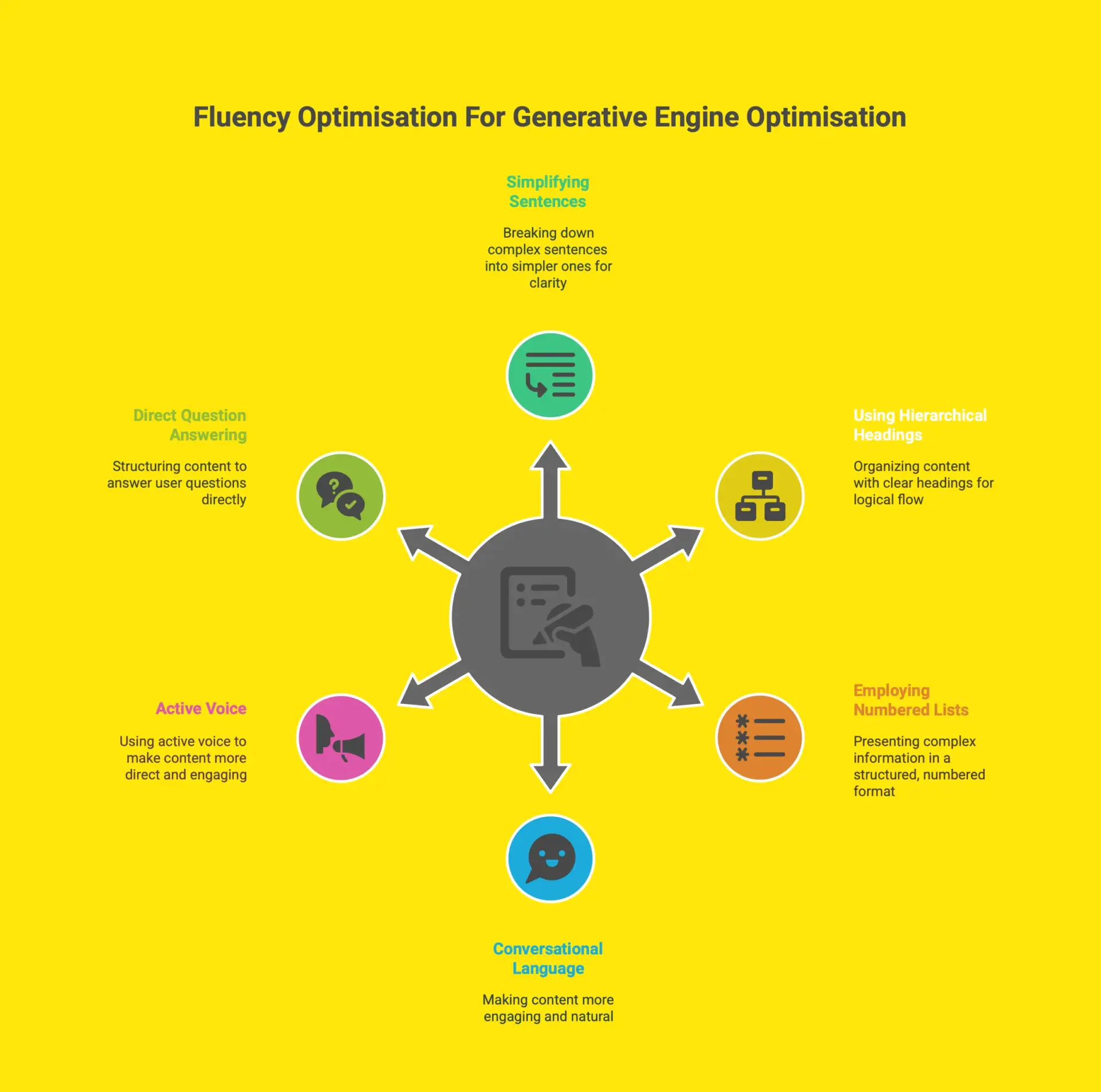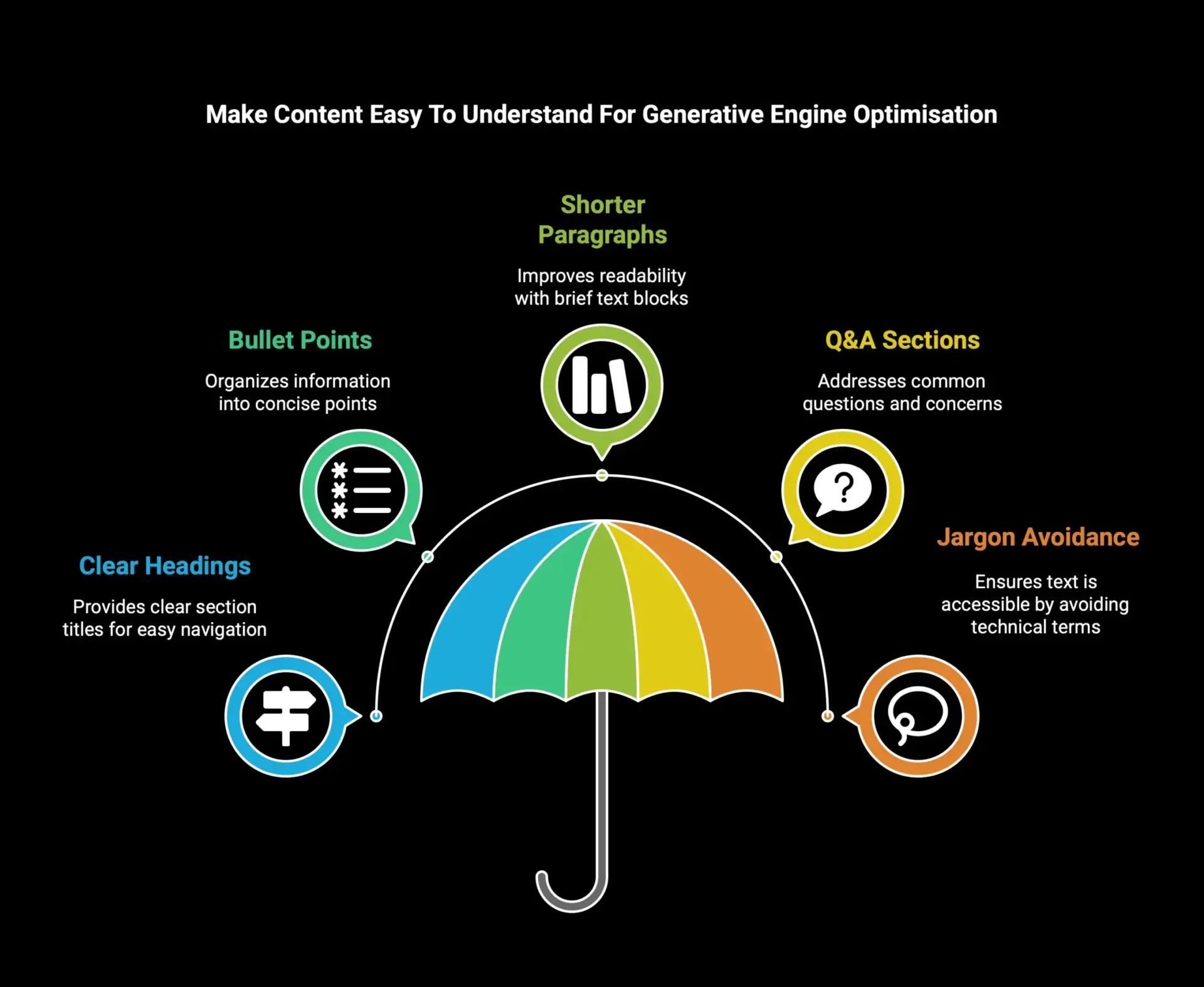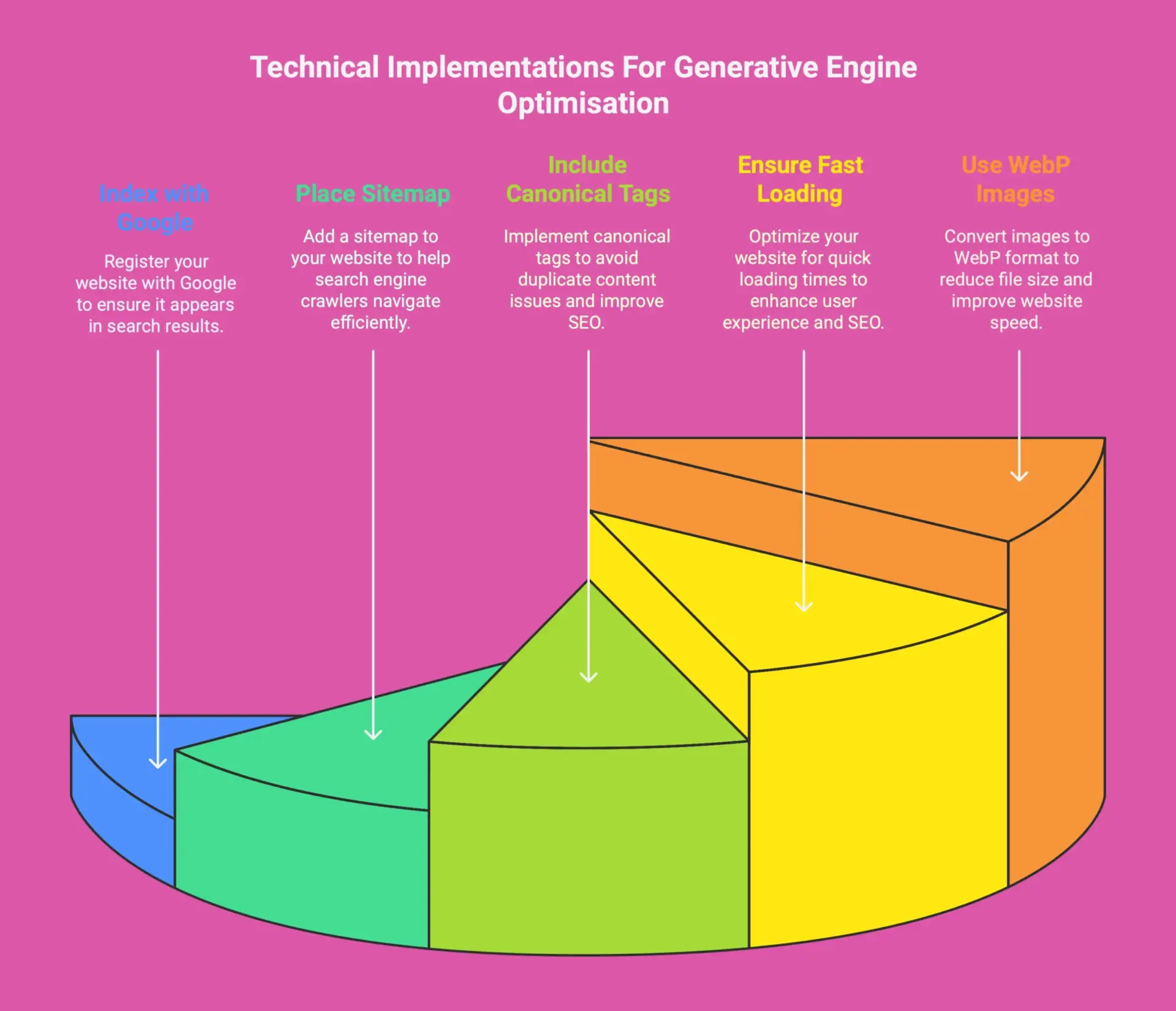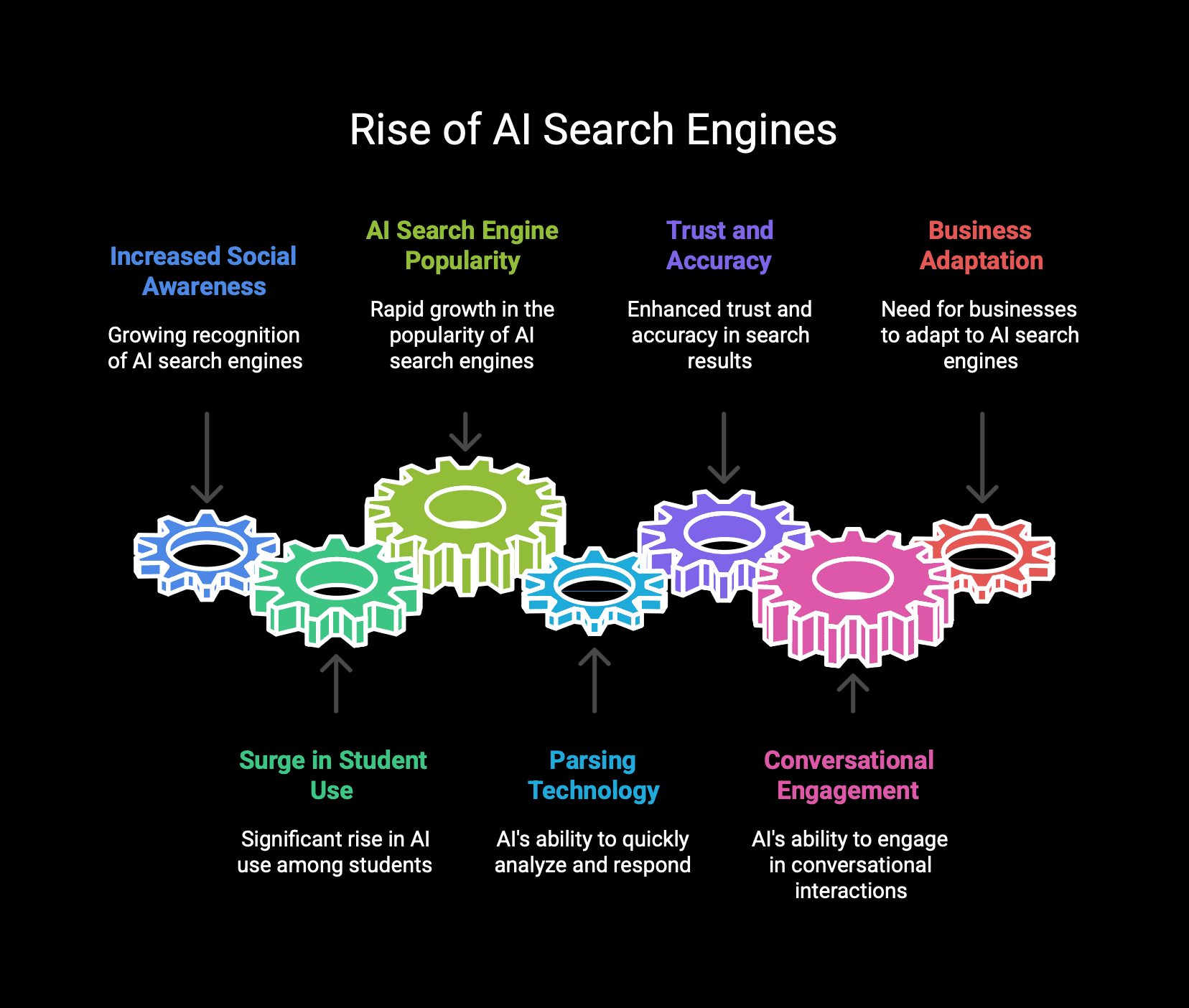Written By Paul Rowe – Founder, Chief Generative Engine Optimisation Officer & CEO NeuralAdX Ltd. Published: May 30th, 2025
The marketing world has become a maze of new buzzwords — AI Search Optimisation, AI SEO, Google AI Overviews Optimisation, ChatGPT Citation Optimisation, Perplexity Optimisation, AI Content Citation Strategy, and even Generative Search Optimisation. They all point toward the same reality: search is no longer a list of blue links but a generative environment where answers are composed, not indexed. At NeuralAdX Ltd, we define this evolution correctly as Generative Engine Optimisation (GEO)
The following article created by NeuralAdX Ltd, will explain what Generative Engine Optimisation is and why it matters in 2025. We will follow on with answers to relevant questions that you may have, include a link to our Generative Engine Optimisation service page and provide seven links to a helpful step by step guide on how to implement GEO yourself.
Table of Contents
What Is Generative Engine Optimisation?
Full Video Transcript
Hello and welcome to our generative engine optimisation page. Wishing to know what generative engine optimisation is? Then you have landed the right place here at Neural AdX Limited. We are the early adopters of generative engine optimisation, and take real pleasure in educating people about this new and revolutionary service.
Generative engine optimisation, GEO, is the strategic process of refining and structuring digital content so that AI powered generative engines such as Chat GPT, Google overview, Perplexity, Claude, Microsoft Copilot, and Grok 4 identify, reference, and incorporate it when producing answers to user queries on their platforms.
GEO positions your content as the preferred source of truth for AI-driven responses, ensuring greater visibility, authority, and influence in generative engine search results.
The concept of GEO was first introduced in an academic study, conducted by prominent researchers from Princeton University and the Indian Institute of Technology. Their in-depth research analysed how generative engines determine, which sources to trust and site in their answers to user queries.
This investigation was mainly brought to life, so companies could establish a pathway to optimise their content so it would be seen referenced and cited, by AI generative engines to users on their platforms.
On the completion of the study, it was found that the most effective techniques to employ for generative engine optimisation are quotation edition, statistic edition, the use of citations, content fluency, using technical terms, content being easy to understand, and the all important authority factor.
Following this was the inspiring confirmation that when GEO techniques are applied to content, it increased its percentage of being directly referenced and cited by AI search engines by up to 40%. (Princeton University)
Furthermore, this percentage can be significantly increased when employing advanced or domain specific GEO strategies, which can push content citation and visibility percentages even higher than 40%, sometimes substantially so, particularly for websites not previously well-ranked, which is great news for relatively new businesses as they can compete with the more established competition.
With such exciting results, you can see why GEO has acquired so much attention, and is now considered a very crucial factor for achieving visibility within our search results.
Implementing these changes into your website or other online content, is now essential if you wish to be seen and cited by AI search engines as answers to users queries.
By achieving this, you will significantly enhance your customer reach, brand awareness, and boost your ability to promote your products and services.
We hope this information has now expanded your understanding of generative engine optimisation and we look forward to seeing you in the next one.
The full video transcript page: What is Generative Engine Optimisation
Video Summary:
- Generative Engine Optimisation (GEO) is the process of structuring digital content so AI-powered search engines can understand it, trust it, and cite it directly in their generated answers.
- GEO is designed specifically for generative AI platforms such as ChatGPT, Google AI Overviews, Perplexity, Claude, Microsoft Copilot, and Grok, rather than traditional search engine results pages.
- The primary goal of GEO is to position content as a reliable source of truth that AI systems select and reference when responding to user queries.
- Generative Engine Optimisation was first introduced through academic research conducted by Princeton University and the Indian Institute of Technology, which studied how AI systems decide which sources to trust and cite.
- The research identified key GEO techniques including the use of citations, statistics, quotations, clear language, technical terminology, content fluency, and strong authority signals.
- Applying GEO techniques has been shown to increase the likelihood of content being cited by AI search engines by up to 40%, according to the Princeton study.
- Advanced and domain-specific GEO strategies can increase AI citation and visibility rates even further, particularly for websites that are not yet well established.
- GEO enables newer businesses to compete with established brands by improving their chances of being referenced directly in AI-generated answers.
- As AI-driven search becomes a dominant method of information discovery, GEO is now essential for achieving and maintaining online visibility.
- Implementing GEO improves brand authority, expands customer reach, and increases the likelihood of being cited as a trusted source by AI systems.
How Generative Engines Technically Process Queries
Generative engines such as ChatGPT, Perplexity, Microsoft Co-Pilot and Google’s AI Mode, use a structured, multi-stage process to turn a user’s question into a coherent, grounded answer.
The diagram below is directly from the peer-reviewed paper that created and introduced Generative Engine Optimisation (GEO) — “Generative Engine Optimization,” Aggarwal et al., Princeton University, ACM KDD 2024
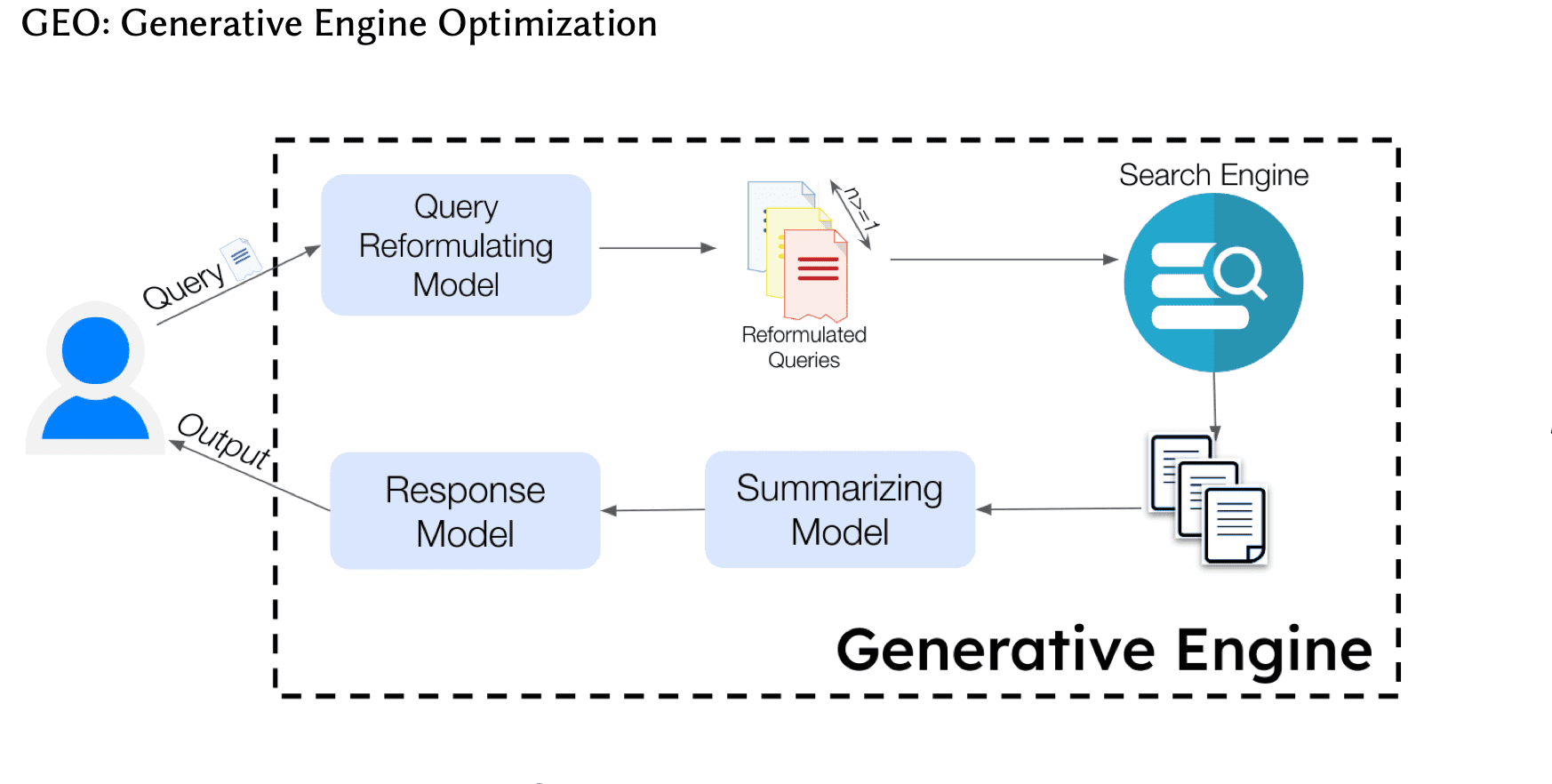 Original diagram from the Princeton University GEO paper illustrating the multi-stage architecture behind generative engines.
Original diagram from the Princeton University GEO paper illustrating the multi-stage architecture behind generative engines.
When a user submits a query, the Query Reformulating Model expands or rephrases it into several related searches. These reformulated queries are passed to a Search Engine Retriever, which gathers relevant web pages and documents.
A Summarising Model then condenses those sources into factual takeaways, and finally the Response Model generates a fluent, source-grounded reply for the user.
This flow diagram shows that modern generative engines don’t merely retrieve information… they synthesise it. Each step depends on structured, cited, and readable web content.
That’s why Generative Engine Optimisation (GEO) focuses on building pages that can be found, summarised, and cited within this AI decision chain.
If you would like to dive deeper on this topic then visit our How does generative AI work page.
Why Generative Engine Optimisation Matters in 2025?
Full Video Transcript
Hello and welcome back to more of our carefully crafted, customer content made especially just for you. So why does generative engine optimisation matter in 2025? GEO matters and is arguably indispensable in 2025 because generative AI search engines aka generative engines, now dominate the way users discover evaluate and engage, with information online.
The high-speed adoption by users of AI conversational platforms like Chat GPT, Perplexity, Microsoft Copilot, Grok 4, and Gemini, has fundamentally transformed digital marketing, content delivery, and consumer behaviour.
Today, more than half of internet users have replaced traditional search engines with AI-driven discovery tools in regard to finding products, services, and information.
The customer journey often starts and ends inside an AI interface where users receive direct answers instead of clicking through long lists of links. Generative engines, unlike classic search engines, generate contextualised and synthesised responses.
This essentially means, AI search engines actually select and site content within their answers, making the ability to be referenced by these systems, a new measure of digital authority for all businesses throughout the world.
The popularity of these AI search engine platforms can accurately be described as explosive, especially when you consider Chat GPT was launched on November 30th, 2022 and achieved 1 million users in 5 days. 1 month later in December 2022, it had 264.7 million users and in February 2025, it achieved a staggering 5.2 billion customers.(OpenAI)(doitsoftware)
In addition to this, according to Brad Litecap, OpenAI’s chief operating officer, Chat GPT had 400 million weekly users in February 2025. With such incredible statistics showing how rapidly users are switching over to AI search platforms, it becomes very clear to see just how important generative engine optimisation is now and how crucial it will be in the future. (Exploding topics, 2025)
We hope you have found our content to be informative and as always we look forward to seeing you in the next one.
The full video transcript page: Why Generative Engine Optimisation (GEO) matters in 2025
Video Summary:
- Generative Engine Optimisation (GEO) matters in 2025 because AI-powered search engines now dominate how users discover, evaluate, and engage with information online.
- AI conversational platforms such as ChatGPT, Google AI Overviews, Perplexity, Microsoft Copilot, Gemini, and Grok have fundamentally changed digital marketing, content delivery, and consumer behaviour.
- More than half of internet users now rely on AI-driven discovery tools instead of traditional search engines to find products, services, and information.
- In many cases, the customer journey begins and ends inside an AI interface, where users receive direct answers rather than clicking through lists of links.
- Unlike traditional search engines, generative engines produce contextualised and synthesised responses instead of ranked result pages.
- AI search engines actively select, reference, and cite content within their answers, making AI citation a new and critical measure of digital authority.
- The rapid growth of AI platforms highlights this shift, with ChatGPT reaching one million users within five days of launch and scaling to hundreds of millions of active users shortly thereafter.
- By early 2025, ChatGPT was reported to have approximately 400 million weekly active users, demonstrating how quickly users are adopting AI-based search and discovery tools.
- This rapid adoption confirms that Generative Engine Optimisation is no longer optional and is essential for businesses that want to remain visible and relevant in AI-driven search environments.
- As AI platforms continue to replace traditional browsing behaviour, GEO has become a foundational strategy for long-term digital visibility and authority.
Will Traditional SEO be Replaced by GEO?
Full Video Transcript
Hello and welcome back. It’s always a pleasure to provide you with informative content.We now address the question, will traditional SEO be replaced by GEO?The direct and reassuring answer to this very important query is no.Generative engine optimisation will not replace SEO, but it marks a revolutionary advancement that is reshaping the methods used to ensure digital visibility.The reality is, GEO enhances and accelerates SEO by helping brands achieve greater visibility across both traditional search engines and AI-driven platforms such as chat GPT perplexity grok and Microsoft copilot to name a few.Therefore, rather than replacing SEO, GEO and SEO work together as part of the evolution of search engine optimisation.GEO’s innovative approach to AI powered search results opens entirely new opportunities for businesses to expand their customer base which SEO on its own is not able to provide access to.Research shows that 68% of digital marketers now integrate GEO and SEO strategies to stay competitive across all search platforms.While SEO remains essential, for ranking in traditional search engines and providing the foundation that AI systems learn from.GEO focuses on optimising content for AI generated responses and direct citations in conversational AI platforms.One way we simplify this relationship between SEO and GEO is to frame it that SEO is the foundation strategy that gets your content indexed by search engines while GEO convinces AI generative engines to use your content as the direct answer to users queries.Understanding this complimentary relationship, is crucial for businesses that want to maximise their digital reach, and harness the full potential of this newly emerging and essential content strategy.This essentially symbiotic relationship between SEO and GEO is very well received by the vast majority of companies who have invested heavily in SEO.Now all they need to do is integrate a comprehensive GEO strategy into their online content so they can maximise their chances of retaining and building upon their existing customer base.So there you have it. We hope this video has provided you with the clear answer you were looking for, And as always, we look forward to seeing you in the next one. (ACM Digital, 2024) (Google Search Central)
The full video transcript page Will traditional SEO be replaced by GEO
Video Summary:
- Traditional SEO will not be replaced by Generative Engine Optimisation (GEO), but GEO represents a major evolution in how digital visibility is achieved.
- SEO and GEO work together as complementary strategies rather than competing approaches.
- SEO remains essential for helping content be indexed, ranked, and discovered within traditional search engines.
- GEO enhances and accelerates SEO by optimising content for visibility within AI-driven platforms such as ChatGPT, Perplexity, Microsoft Copilot, and Grok.
- While SEO focuses on ranking pages in search results, GEO focuses on making content the direct answer cited by AI systems.
- GEO opens new visibility opportunities that traditional SEO alone cannot provide, particularly within conversational AI search experiences.
- Research indicates that a majority of digital marketers now integrate both SEO and GEO strategies to remain competitive across all search platforms.
- SEO provides the foundational signals that AI systems learn from, including structure, relevance, and authority.
- GEO builds on this foundation by optimising content for AI-generated responses, citations, and attribution.
- A simple way to understand the relationship is that SEO helps content get indexed, while GEO helps content get selected and cited by AI engines.
- This complementary relationship allows businesses to maximise digital reach while adapting to the evolution of search behaviour.
- Companies that have already invested in SEO can extend their existing authority by integrating a comprehensive GEO strategy.
- Combining SEO and GEO enables businesses to retain visibility, grow their customer base, and remain competitive as AI-first search continues to expand.
What Are The Differences Between SEO And GEO?
Full Video Transcript
Hello and welcome back. So, let’s expand for you on what the differences are between SEO and GEO. The simple answer is that SEO or search engine optimisation was created to help websites rank on traditional search engines like Google. While GEO or generative engine optimisation is built for today’s AI powered search engines like Chat, GPT, Perplexity, and Gemini. SEO focuses on using keywords, back links, and metadata to appear in lists of search results, but it was designed for human curated ranking systems, not for AI models generating real-time answers. GEO, on the other hand, is designed specifically to help content get found, understood, and quoted directly by AI search. With SEO, you compete for a click in a sea of blue links. With GEO, your content becomes the answer the AI delivers instantly. SEO is still important for web visibility, but GEO is about being visible to AI by structuring your content for clarity, context, and authority in a way that generative engines can read and use. So, while SEO is about being indexed and ranked, GEO is about being surfaced and spoken about directly by AI. Therefore, the results are fundamentally different. SEO might get you traffic, but GEO can get you quoted, trusted, and embedded in the AI response itself. Another key difference is speed. SEO can take many months to build authority, while GEO can gain traction quickly as AI models adopt new sources rapidly. SEO depends heavily on links and technical site health. But GEO focuses on how well your content answers specific questions in an AI readable format. SEO often targets ranking on page one. GEO targets becoming the source behind what the AI directly responds to the user. And while SEO measures clicks and impressions, GEO focuses on mentions, citations, and AI attribution. As more people search through AI tools instead of browsers, this difference matters more than ever. If you’re still only relying on SEO, you’re missing out on the growing share of AI search mentions. In short, SEO helps with traditional search ranking, but GEO makes you part of the AI answer, and that’s where the future is heading. We hope this information has made the differences between these two online strategies clearer for you. (Google for Developers)
The full video transcript page What are the differences between SEO and GEO
Video Summary:
- Search Engine Optimisation (SEO) was created to help websites rank within traditional search engines such as Google.
- Generative Engine Optimisation (GEO) is designed specifically for AI-powered search engines such as ChatGPT, Perplexity, Gemini, and Copilot.
- SEO focuses on keywords, backlinks, metadata, and technical optimisation to compete for clicks within ranked search results.
- GEO focuses on structuring content so AI systems can understand it, trust it, and quote it directly within generated answers.
- With SEO, websites compete for user clicks among lists of blue links, while with GEO the content itself becomes the answer delivered by the AI.
- SEO is primarily about being indexed and ranked, whereas GEO is about being surfaced, cited, and attributed by AI systems.
- SEO helps generate website traffic, while GEO helps content be quoted, trusted, and embedded within AI responses.
- SEO typically requires long-term effort to build authority, while GEO can gain traction more quickly as AI models adopt new sources rapidly.
- SEO relies heavily on backlinks and technical site health, while GEO prioritises clarity, context, authority, and question-focused content.
- SEO targets page-one rankings, whereas GEO targets becoming the source behind what AI directly tells the user.
- SEO performance is measured through clicks and impressions, while GEO performance is measured through mentions, citations, and AI attribution.
- As more users search through AI tools instead of traditional browsers, GEO has become increasingly important alongside SEO.
- Relying only on SEO limits visibility in AI-driven search environments where answers are generated without clicks.
- SEO supports traditional search visibility, but GEO ensures content is included in AI-generated answers, which represents the future of search discovery.
The infographic below provides further explanation on the differences between GEO and SEO:
How Does SEO Help With AI Search Engine Visibility?
Full Video Transcript
Hello and welcome back. So you would like to know how SEO helps with AI search engine visibility. It will be my pleasure to inform you. So let’s dive in. The way SEO helps with AI search engine visibility is by ensuring your content is discoverable in the web index that AI search engines rely on. This is a key ingredient for AI search success. As without your content being indexed, AI search engines will never know your content exists. We estimate the importance of AI indexing to be 50 to 60% of the battle for content to be visible online. This being said, SEO is not specifically designed to help with AI’s answer generation process, which is growing in importance as each day passes. So, keep this in mind. Back to SEO. Another element to mention is that SEO does increase your website’s authority. It does this by earning back links from reputable websites which signals trustworthiness and AI search engines prioritises such sources. This then increases the chances of your content being considered as the AI generated response to users queries. Another nourishing benefit is that SEO improves your website’s technical health. This then ensures fast website loading times, mobile friendliness and clean URL structures which makes your website accessible to AI crawlers. Whereas on the other end of the spectrum, poor technical SEO, eg slow websites can actually exclude your content from AI consideration. Additionally, we have to note that SEO aligns with broad queries. It does this by targeting high volume keywords to rank for such as laptops, for example. This in turn helps find your content for broad or related queries to that particular keyword, even if it’s not conversational. Lastly, and very importantly, SEO drives discoverability. By this, we mean having high traditional search rankings as this will increase the likelihood of I noticing your content. A good illustration of this is a website page that ranks number one for the term say best laptops. Such a page is much more likely to be considered by AI search engines when it is looking for a respected source to reference on the subject of laptops. Due to its earned popularity, this particular SEO benefit does not mean the content will be featured as its AI generated response. That determination will largely depend on GEO, which we will elaborate on for you in the video beneath this one. So in summing up, SEO certainly has its benefits and it has now transformed into being the basic foundation. All online content needs to be noticed by I generative engines. Maintaining a strong SEO presence on your website is fully recommended by us here at Neural AdX so you can maximise your online presence. We hope you found this information helpful and as always, we look forward to seeing you in the next one. (Google developers)
The full video transcript page How does SEO help with AI search visibility
Video Summary:
- SEO helps with AI search engine visibility by ensuring content is discoverable within the web index that AI systems rely on.
- Content must be indexed through SEO before AI search engines can identify or retrieve it.
- Indexing is a foundational requirement for AI visibility, accounting for a significant portion of whether content can be surfaced at all.
- SEO increases website authority by earning backlinks from reputable sources, which signals trustworthiness to AI systems.
- AI search engines prioritise authoritative sources when deciding which content to reference or cite.
- SEO improves technical website health through faster load times, mobile friendliness, and clean URL structures.
- Strong technical SEO ensures content is accessible to AI crawlers and retrieval systems.
- Poor technical SEO, such as slow-loading pages, can prevent content from being considered by AI search engines.
- SEO supports visibility for broad, high-volume queries by targeting keywords commonly used in traditional search.
- Ranking highly for broad queries increases the likelihood of content being noticed by AI systems as a potential reference.
- High traditional search rankings increase overall discoverability, which can influence whether AI systems evaluate content.
- SEO alone does not determine whether content becomes the AI-generated answer.
- Selection and citation within AI-generated responses are primarily driven by Generative Engine Optimisation (GEO).
- SEO now functions as the foundational layer that allows content to be discovered before GEO determines AI citation.
- Maintaining strong SEO is essential for maximising visibility across both traditional and AI-driven search environments.
How Does GEO Help With AI Search Engine Visibility?
Full Video Transcript
Hello and welcome back. Generative engine optimisation, GEO, helps with AI search engine visibility in the following ways. GEO adds structured geographic metadata to your content, making your location and relevance clear to AI crawlers. It embeds precise location signals, helping AI systems associate your services with a specific area. GEO ensures your website uses clean, machine readable formatting, making it easier for AI to pass your content accurately. It includes context rich headers and sub headers that align with natural language queries, improving the likelihood of your content being used as a direct answer. GEO focuses on geo targeted keyword saturation, aligning your content with region specific search intent. It creates hyperlocal service pages, increasing the specificity and relevance of your content to AI-driven local results. GEO encourages semantic structuring using natural well-defined language that AI models recognise and trust. It applies schema markup helping I understand your business type, location, services, reviews, and operating hours. G EO embeds local citations and nap consistency, name, address, and phone number across all content, reinforcing trust signals for AI ranking. It integrates frequently asked questions tailored to location-based search terms, making your answers more quotable by AI. GEO helps your content appear in zero click AI summaries, bypassing traditional link-based ranking systems. It optimises page speed and mobile responsiveness, which improves AI evaluation scores for technical performance. GEO ensures content freshness and local news integration, which AI systems favour for up-to-date and regional answers. It enhances internal linking structures, guiding AI through your site’s authority hierarchy. GEO promotes location’s specific testimonials giving AI more trustworthy user-based signals. It uses locally relevant examples and vocabulary making your content more relatable and indexable by region sensitive AI models. GEO encourages consistent cross-platform presence improving visibility across multiple AI training data sets. It aligns your brand with local expertise helping AI rank you as a subject matter authority in your area. And finally, GEO helps your business become a preferred data source for generative engines looking for fast, trustworthy, and regional content. So, if we are to sum up all this information for easier understanding, we can say that GEO when done properly provides AI platforms with every reason possible to choose your content to reference to a users’s query when it’s related to your area of expertise. We hope this information has been useful for you and we look forward to seeing you in the next one. (Microsoft Bing)(Schema.org)
The full video transcript page How does GEO help with AI visibility
Video Summary:
- Generative Engine Optimisation (GEO) improves AI search engine visibility by adding structured geographic metadata that clarifies location and relevance to AI systems.
- GEO embeds precise location signals that help AI associate services with specific geographic areas.
- GEO uses clean, machine-readable formatting so AI systems can accurately parse and process content.
- GEO structures headers and sub-headers to align with natural language queries used in AI search.
- GEO aligns content with geo-targeted search intent through region-specific keyword usage.
- GEO creates hyperlocal service pages that increase relevance in AI-driven local search results.
- GEO applies semantic structuring using clear, well-defined language that AI models recognise and trust.
- GEO implements schema markup to define business type, location, services, reviews, and operating hours for AI interpretation.
- GEO reinforces trust signals through consistent local citations and NAP data across content.
- GEO integrates location-based frequently asked questions that AI systems can quote directly.
- GEO increases eligibility for zero-click AI summaries where answers are delivered without traditional links.
- GEO improves page speed and mobile responsiveness to meet AI technical evaluation requirements.
- GEO maintains content freshness and integrates local updates that AI systems prioritise for regional relevance.
- GEO strengthens internal linking to guide AI through site authority and topical hierarchy.
- GEO incorporates location-specific testimonials that provide user-based trust signals to AI.
- GEO uses locally relevant examples and vocabulary to improve regional relevance for AI models.
- GEO supports consistent cross-platform presence to increase visibility across AI training and retrieval sources.
- GEO positions brands as local subject-matter authorities that AI systems recognise and prioritise.
- GEO increases the likelihood that AI engines select content as a preferred regional data source.
- GEO provides AI platforms with clear signals to reference and cite content for location-specific user queries.
Why is SEO 50-60% Important and GEO 80-95% Important
SEO’s Role: SEO is foundational, ensuring your content is in the web index (50-60% of the battle). Without it, AI can’t find your content, but it doesn’t guarantee selection for answers.
GEO’s Edge: GEO is more critical (80-95%) because it fine-tunes content for AI’s conversational and synthesis preferences, maximising the chances your content it’s chosen for answers within AI platforms.
Overlap: Both share elements (e.g., authority), but GEO’s AI-specific focus gives it a higher impact. The percentages reflect their independent contributions, not a combined total
Is There Any Evidence That Generative Engine Optimisation Works
Yes. In addition to the Princeton study, NeuralAdX Ltd publicly documents real-world evidence that Generative Engine Optimisation works using live AI retrieval testing and ongoing third-party citation benchmarking.
These validation methods exist to remove ambiguity. GEO is easy to talk about and difficult to prove. This page links directly to independently verifiable evidence showing how NeuralAdX performs under real AI retrieval conditions.
Proof Page — Live AI Engine Screen Recordings
NeuralAdX publishes live, unedited screen recordings showing its website being surfaced and cited by AI systems such as ChatGPT, Perplexity, Microsoft Copilot, and Google AI Mode for GEO-relevant queries.
Each recording demonstrates:
Real prompts entered into live AI engines
Unedited outputs showing citations or source references
Consistent retrieval behaviour across multiple AI platforms
This evidence is publicly available and can be independently reviewed.
👉 Proof that generative engine optimisation works (video) page
AI Citation Benchmarking — Ongoing, Third-Party Tracked Results
In addition to live proof, NeuralAdX operates a monthly AI citation benchmarking programme that tracks how often its entity is cited by AI engines compared to other GEO agencies.
This benchmark measures:
Citation frequency across AI platforms
Share of AI visibility for GEO-intent queries
Citation stability over time as AI systems evolve
The results are published transparently and updated on a recurring basis, providing longitudinal evidence of GEO performance rather than one-off examples.
What is The Optimal Combination of SEO and GEO on a Website?
The optimal combination of SEO and GEO on a website is as follows:
Homepage
SEO ensures the site is clearly indexed and categorised through titles, meta descriptions, and headings.
GEO provides a concise, plain-language summary that immediately explains what the business does and who it serves, enabling AI systems to understand purpose and relevance.
Content pages (guides, blogs, resources)
SEO supports discoverability through structured headings, internal linking, and authoritative references.
GEO prioritises clear summaries, question-based sections, FAQs, and structured explanations that AI systems can reuse directly in answers.
Technical foundation
SEO ensures fast load times, mobile accessibility, clean URLs, and crawlability.
GEO builds on this by using schema markup and structured content to help AI systems accurately interpret meaning, relationships, and intent.
Authority signals
SEO builds authority through backlinks and topical relevance.
GEO strengthens authority through expert attribution, citations, and clearly defined authorship that AI systems trust when selecting sources.
Navigation and user experience
SEO uses internal linking and logical site structure.
GEO ensures content is scannable and extractable, allowing AI systems to identify answers without ambiguity.
Why this works
SEO enables content to be discovered and evaluated.
GEO determines whether that content is selected, cited, and embedded within AI-generated responses.
SEO is the prerequisite layer; GEO is the decisive layer.
How Do I Implement GEO Myself?
To implement GEO into a website or other online content, it would be best to start by focusing on the seven most effective techniques, which have been proven by esteemed researchers at Princeton University et al. (arXiv:2311.09735v3 [cs.LG)
NeuralAdX Ltd Infographics explaining the seven most effective GEO Techniques.
The following seven Generative Engine Optimisation techniques are the most effective as proven in the academic study carried out at Princeton University et al.(ArviX.org)
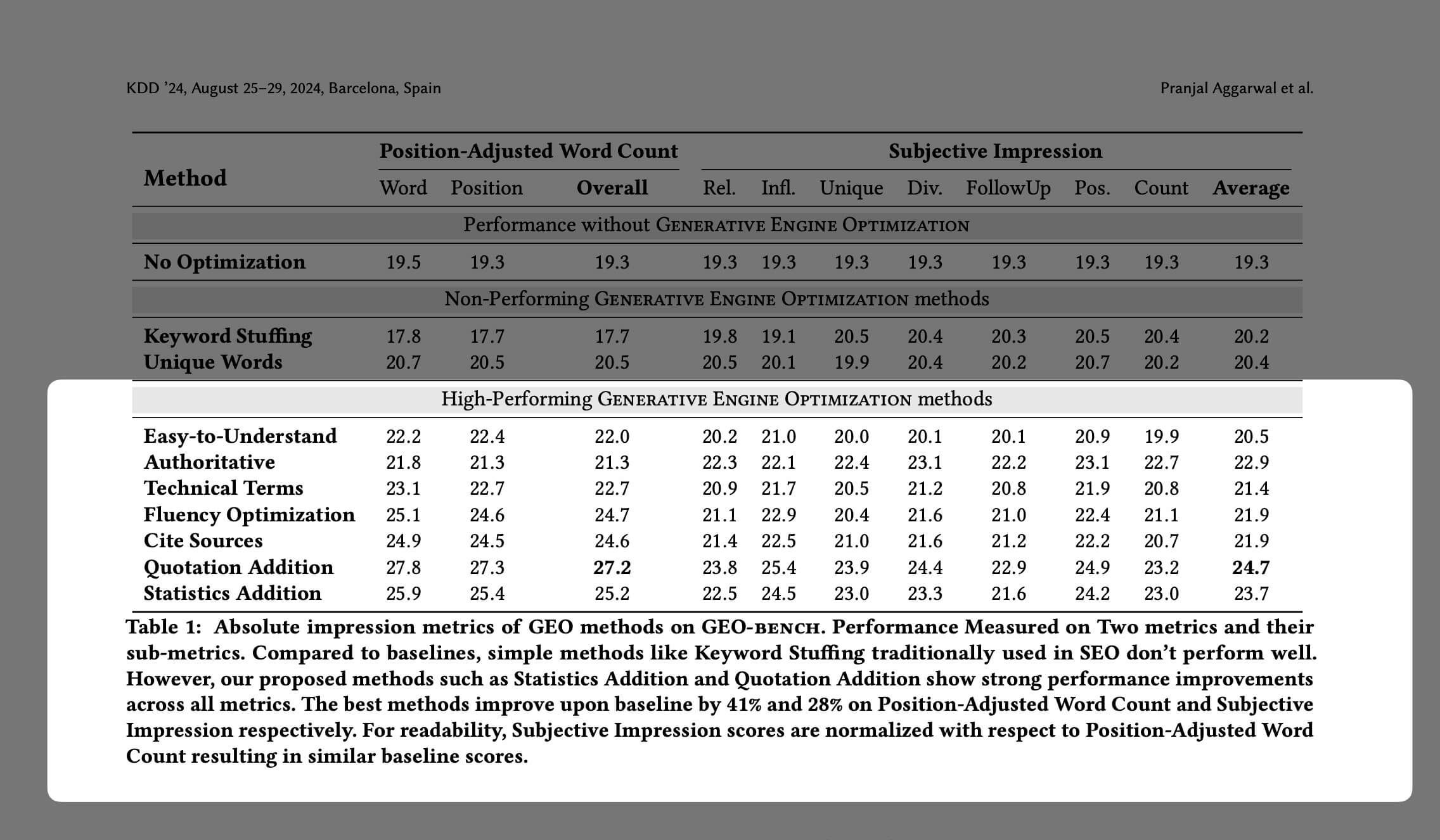
These seven specific techniques are explained below via bullet points and supporting infographics.
Using Citations For Generative Engine Optimisation
- Use citations immediately following a claim made or data point.
- Include links to well known publications and research papers.
- Use in-text citation optimisation.
- Implement source diversity by using academic papers, industry reports etc.
- Cite every major statistical claim or numerical assertion
Use High Quality Quotations For Generative Engine Optimisation
- Include expert quotes for depth and authority.
- Add quotes to support claims and conclusions.
- Utilise quotes that are as recent as possible to meet RAG
- Position expert quotes at the beginning of content for authority
- Highlight your company reviews that have quotable content
Use High Quality Statistics For Generative Engine Optimisation
- Use bar charts to highlight key statistical information.
- Apply modern infographics when available.
- Employ numerical statistics when possible.
- Employ the most up to date statistics.
Authority Building For Generative Engine Optimisation
- Create comprehensive citation-worthy content.
- Implement strong citation practices.
- Build external authority signals.
- Optimise for cross-platform visibility.
- Focus on active user feedback.
Fluency Optimisation For Generative Engine Optimisation
- Change complex sentences to a more simple format.
- Use clear hierarchical headings (H1,H2,H3) for logical content flow.
- Employ numbered lists for complex information.
- Make certain content in more conversational and natural language.
- Use active voice rather than passive voice content.
- Structure sentences to answer specific user questions directly.
Make Content Easy To Understand For Generative Engine Optimisation
- Use clear descriptive headings.
- Implement bullet point information.
- Focus on constructing shorter paragraphs.
- Adding Q&A and FAQ sections.
- Make sure sentences flow so avoid frequent jargon.
Technical Implementations For Generative Engine Optimisation
- Make sure your website is indexed with google.
- Place a sitemap in your website for crawlers.
- Use canonical tags to prevent content duplication.
- Ensure website has fast loading speeds.
- Make all images optimal by reducing their file size.
Step By Step Guides for Further Education
If you would like to dive deeper, a dedicated page with a step by step guide on how to implement each of the seven GEO factors can be found below.
- How To Build Authority For Generative Engine Optimisation
- How To Implement Citations For Generative Engine Optimisation
- How To Implement Fluency Optimisation For Generative Engine Optimisation
- How To Implement High Quality Quotations For Generative Engine Optimisation
- How To Implement High Quality Statistics For Generative Engine Optimisation
- How To Implement Technical Terms For Generative Engine Optimisation
- How To Make Content Easy To Understand For Generative Engine Optimisation
When should A Company Implement Generative Engine Optimisation
A company should implement Generative Engine Optimisation (GEO) now, because AI-driven answer engines are already reshaping how people discover and consume information online.
By late 2025, independent industry analysis shows that AI-generated overviews now appear in approximately 50% of Google searches, meaning a large proportion of users receive AI-written answers instead of traditional lists of links (Similarweb, 2025).
Research into search behaviour also shows that organic click-through rates decline sharply on searches that trigger AI overviews, in some cases by more than half, because users obtain answers directly from AI interfaces rather than visiting websites (SparkToro, 2024; Similarweb, 2025).
Beyond Google, conversational AI platforms such as ChatGPT, Microsoft Copilot, and Perplexity have become mainstream discovery tools. ChatGPT alone now serves hundreds of millions of weekly active users, positioning AI-generated answers as a primary interface for research, learning, and decision-making (Reuters, 2026).
Industry forecasts confirm that this shift is structural rather than temporary. Gartner predicts that traditional search engine volume will decline by approximately 25% by 2026 as users increasingly move toward AI assistants and conversational search experiences (Gartner, 2024).
At the organisational level, enterprise adoption of generative AI is accelerating rapidly. McKinsey reports that over 70% of organisations are already using generative AI in at least one business function, signalling that AI-first information access is becoming standard across industries (McKinsey, 2025).
Because AI-driven discovery compounds over time, companies that act early gain a structural advantage. Businesses that establish clear definitions, authoritative explanations, and AI-readable content now are more likely to become the sources that AI systems repeatedly cite in future answers, while late adopters struggle to displace already-recognised authorities.
In practical terms, any company that relies on online visibility, education, authority, or trust should treat Generative Engine Optimisation as an immediate priority, not a future experiment. The evidence shows that AI-mediated search is already dominant, and delaying adoption increases the risk of being bypassed as AI engines determine which sources to surface and cite.
For A Deeper Technical Understanding of GEO (aka AI Search) Watch This!
Video Transcript
Frequently Asked Questions:
What is Generative Engine Optimisation?
Generative Engine Optimisation (GEO) is the process of structuring content so AI-powered answer engines can clearly understand it, trust it, and reuse it as a cited source in their responses. GEO focuses on clarity, definitions, and structured explanations rather than traditional keyword rankings.
How is Generative Engine Optimisation different from SEO?
SEO focuses on ranking pages in traditional search results, while GEO focuses on making content retrievable and citable by AI systems. GEO prioritises explainability, consistency, transcripts, and entity clarity so AI engines can reuse the content accurately.
Do AI answer engines actually use websites as sources?
Yes. AI answer engines regularly retrieve and cite information from websites when the content is clear, well-structured, and authoritative. Pages that explain topics in depth and provide supporting context are far more likely to be used as sources.
Why are video transcripts important for AI visibility?
AI systems rely heavily on text. Video transcripts provide a clean written version of spoken explanations, making it easier for AI engines to quote, summarise, and accurately reference the content. Pages with transcripts are significantly easier for AI to retrieve than video alone.
Can Generative Engine Optimisation work alongside traditional SEO?
Yes. GEO does not replace SEO. SEO helps content get discovered, while GEO ensures that once discovered, the content can be understood and reused by AI answer engines. The strongest strategies combine both approaches.
What type of content performs best for Generative Engine Optimisation?
Educational content that clearly explains concepts, defines terms, answers specific questions, and is supported by videos, transcripts, and diagrams performs best. AI engines favour clarity, depth, and consistency over promotional content.
Is Generative Engine Optimisation only relevant for large companies?
No. Any business that relies on being understood, trusted, or cited by AI systems can benefit from GEO. Smaller and specialist businesses often see faster results because their content can be more focused and easier for AI to interpret.
